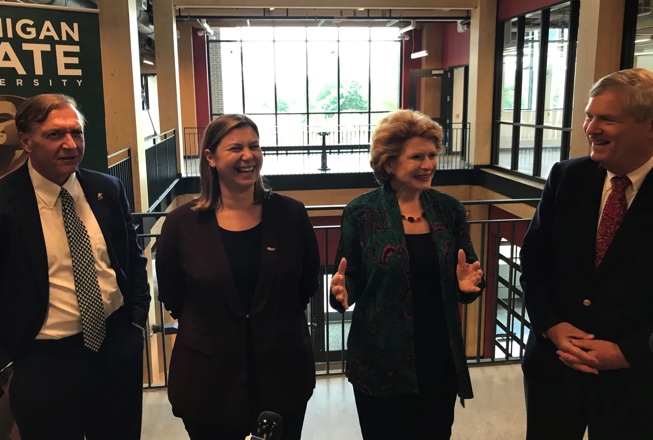USDA Secretary Vilsack Talks Ag Aid in Michigan
Michigan welcomed U.S. Secretary of Agriculture Tom Vilsack with a series of in-person agricultural outreach events in early June.
Vilsack's visit comes hot on the heels of the White House announcing over $5 billion in potential funding for U.S. agricultural supply chain and conservation land management through its Build Back Better initiative. The USDA also announced this Spring over $6 billion in additional ag and food production aid through the USDA Pandemic Assistance effort.
Among Vilsack's stops was a round table hosted at MSU's new Mass Timber STEM Facility on June 11 by Senator Debbie Stabenow, and joined by Congresswoman Elissa Slotkin and MSU President Samuel Stanley.
As U.S. Senate Chair of Agriculture, Nutrition, and Forestry, Stabenow is pushing carbon markets and forest credits as new low-cost 'green' income options for farmers of all scales of production and land ownership, while also helping address the country's growing climate concerns.
“Michigan farmers and foresters are on the front lines of the climate crisis," said Stabenow. "They are also a big part of the solution.”
"Because effective conservation practices enable them to store carbon in their soil and trees, many farmers and foresters want to engage in carbon markets, but don’t know where to start."
MACD Executive Director Dan Moilanen also attended the round table at MSU. When he was given the floor during Q&A, Moilanen eagerly advocated for Michigan's Conservation Districts as an ideal partner to distribute new USDA farmer-focused climate initiatives among the state's many private and family-owned farms and forest lands.
"It's encouraging that the Biden Administration, Senator Stabenow, and Congresswoman Slotkin see Conservation Districts as a potential mechanism for addressing climate change," said Moilanen following the event. "All the more reason why the State of Michigan must support the work we do by providing base operational funding through the legislature so that all 75 of Michigan's Conservation Districts are ready to hit the ground running to implement any new programming.
"Michigan is the only state in the upper Midwest that doesn't provide a base level of operational funding to Conservation Districts, which were created and mandated under state law."
Vilsack's USDA is also looking to improve support for small-scale American farmers, particularly hard hit with supply chain disruptions over the last year.
"The COVID-19 pandemic led to massive disruption for growers and food workers. It exposed a food system that was rigid, consolidated, and fragile. Meanwhile, those growing, processing, and preparing our food are earning less each year in a system that rewards size over all else," said Vilsack recently, who is also co-chair of the Biden Administration's newly minted Supply Chain Disruptions Task Force.
“The Build Back Better initiative will make meaningful investments to build a food system that is more resilient against shocks, delivers greater value to growers and workers, and offers consumers an affordable selection of healthy food produced and sourced locally and regionally by farmers and processors from diverse backgrounds.”
To that end, Vilseck's visit to the Great Lakes State also included a meet and greet lunch along with Slotkin at Hawkins Homestead Farm in Mason. While there, topics eventually turned to supply chain concerns and how to improve per-acre incentives for well known climate-friendly land practices, such as no-till farming and cover crops.
"The current level of payment isn’t sufficient,” Vilsack said. “Farmers aren’t participating. We need to create a system for farmers that’s financially appealing. This is an opportunity to be paid for things already being done.”
MACD thanks The Detroit News and Michigan Farm Bureau for their contributing coverage of Vilsack's visit.